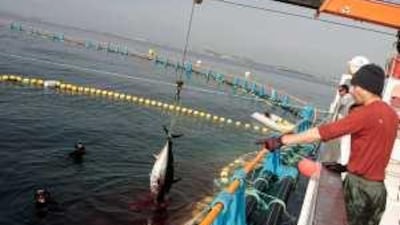The UAE could one day be farming the prized but endangered Atlantic bluefin tuna, scientists said yesterday. The fish is usually consumed raw in sushi and sashimi dishes and is so valued for its tender meat that only luxury seafood restaurants can afford to serve it. Prices can reach hundreds of thousands of US dollars for a single fish, which are often the size of a man.
In January last year, a 200kg specimen of a related species, the Pacific bluefin tuna, reached a record US$220,000 (Dh810,000) at auction in Japan. Because of the huge profits to be made, bluefin fisheries in the wild have been declining steadily; populations in the Mediterranean and the eastern Atlantic could become extinct within three years, according to the World Wide Fund for Nature. Yesterday, the Environment Agency-Abu Dhabi (EAD) revealed it will be importing technology developed by Japan's Kinki University which has been producing bluefin tuna commercially since 2004 and is the only place in the world where the endangered fish is farmed through its full developmental cycle.
"No one in the world has managed to farm these fish besides the scientists at Kinki University," said Majid al Mansouri, the secretary general of the EAD. "I went there myself to see how it is done." The tuna are raised in captivity, but he said they still can reach large sizes. "I thought they were dolphins," he said. Earlier this week, the Japanese researchers, lead by Hiroshige Seko, the vice president of the university, presented a 60kg specimen to Sheikh Mohammed bin Zayed, the Crown Prince of Abu Dhabi and Deputy Supreme Commander of the Armed Forces.
It is not yet know when and where production will start. "I think it will take some time," said Dr Thabit Zahran al Abdessalaam, the EAD's director of biodiversity sector. He said more details would emerge with the completion of a feasibility study. The study, which could start as early as autumn, is expected to calculate the expense of the project and also help identify a suitable site for a pilot facility to be built. Sir Bani Yas Island and Delma Island are two possible locations, Dr al Abdessalaam said.
The Abu Dhabi Government will pay for the project. The Japanese team will need to adjust their technique to the UAE's climate. Bluefin tuna are notoriously difficult to raise in captivity, the scientists said. Some of the problems stem from their behaviour, such as cannibalism in the early stages of development. They also need to swim continuously, even when asleep, to be able to breathe. One of the most difficult aspects of farming the species has been to get them to produce a steady supply of eggs.
Mr Seko said two concerns for farming the fish in Abu Dhabi were the high temperature of the water here, as well as its high salinity. "I feel confident that we can overcome these challenges," he said. One possible solution would be to import juvenile fish hatched in Japan. This, said Yoshifumi Sawada, a professor at the Fisheries Laboratory at the university, would require finding a way to transport the fish to the UAE safely.
Dr al Abdessalaam said another option was to raise the fish indoors under strictly monitored conditions, currently the practice in Japan. The technique, called "closed re-circulation system", is more environmentally friendly because it helps contain pollution. Fish farms usually release large amounts of nutrients and chemicals, such as antibiotics, into the environment. He said the plan to raise bluefin tuna was part of an overall focus on aquaculture as a way of diversifying Abu Dhabi's economy.
Fish farming, said Dr al Abdessalaam, was also a way to reduce pressure on the country's dwindling wild fish resources. The idea of farming bluefin tuna here has detractors. Some say its dependence on small fish, such as sardines, for food depletes populations of these species, used as a cheap source of protein by people in developing countries. Also, sushi connoisseurs say farmed bluefin is not as tasty as the wild-caught variety.
Dr al Abdessalaam said he disagrees. "I was in Japan in October and I tasted it," he said. "It tasted good." The Japanese scientists brought forward what they say are two other advantages to their product: farmed bluefin is half the price of wild-caught bluefin and it contains less mercury, a pollutant found in high concentrations in predatory fish. @Email:vtodorova@thenational.ae

